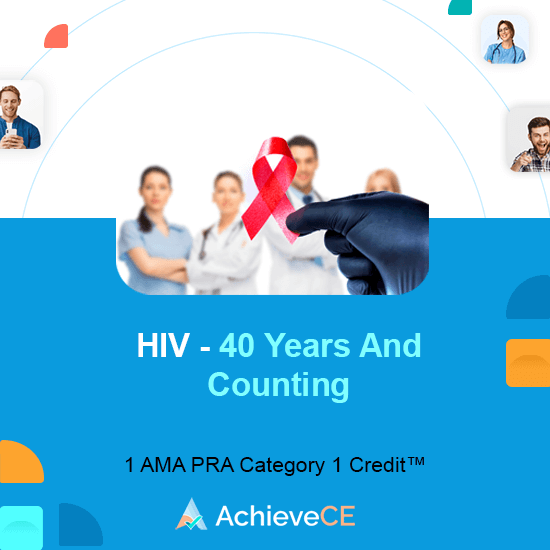HIV/AIDS CME
1 - 4 of 4 results
- FREE
ScientiaCME Integrating novel PrEP options as a step toward ending the HIV epidemic
Activity Description / Statement of Need:
In this online, self-learning activity:According to the Centers for Disease Control and Prevention (CDC), there are nearly 1.2 million people aged 13 years and older living with HIV (PLWH) in the U.S. Since the beginning of the HIV epidemic in the 1980s, advances in public health initiatives and treatments have considerably lengthened the life expectancy of PLWH, while simultaneously reducing transmission and diagnosis of new cases. Nonetheless, an estimated 31,000 people are infected with HIV each year in the United States, with the highest incidence in people from underserved and marginalized communities. As a result, a key component of the federal Ending the HIV Epidemic (EHE) strategy is to prevent new HIV infections by expanding use of evidence-based interventions.
Target Audience:
See full details chevron_right
HCPs including: Infectious disease specialists, primary care physicians, and public health professionals; physician assistants, nurse practitioners, and pharmacists who practice in infectious disease; and any other HCPs with an interest in or who clinically encounter HIV.- Cost: Free
- Credit hours: 1
- CME credits awarded by: ScientiaCME
- Format: On-Demand Online
- Material last updated: July 22, 2023
- Expiration of CME credit: July 22, 2024
Infection Control for Physicians
Infection Control for Physicians will help you to:
• Use evidence-based risk management practices and current guidelines to control infection in health care personnel;
• Improve your knowledge and skills in blood borne infection, drug resistant organisms, and outpatient respiratory illness; and
• Meet state infection control training requirements.Meets Special CME Requirements in Connecticut, New York, Pennsylvania, Rhode Island (Universal Precautions), Rhode Island (Infection Control / Modes of Transmission) and Texas.
Target Audience: Physicians focusing on Infection Control.
See full details chevron_right- Cost: $25 per credit
- Credit hours: 2
- CME credits awarded by: University of Arizona College of Medicine at the Arizona Health Sciences Center
- Format: On-Demand Online
The Immune Reconstitution Syndrome in AIDS
After completing the Immune Reconstitution Syndrome in AIDS, you should be better able to:
• Recognize that restoration of immunologic function in persons with HIV disease may lead to a worsening clinical picture, the immune reconstitution syndrome.
• Diagnose and manage occult opportunistic infections in persons with newly treated HIV disease.
• Treat CNS cryptococcal disease in persons with AIDS.Meets Special CME Requirements in Connecticut and Florida.
Target Audience: Physicians focusing on Infectious Diseases.
See full details chevron_right- Cost: $25 per credit
- Credit hours: 1
- CME credits awarded by: University of Arizona College of Medicine at the Arizona Health Sciences Center
- Format: On-Demand Online
AchieveCE HIV – 40 Years And Counting…
With eight categories of HIV meds now available, healthcare professionals need to be up to date about these therapies. Whether using regimens from 20 years ago, or the newest drugs healthcare professionals need to be monitoring adherence to those regimens. By providing data from the San Francisco Study to show the needs for 95% adherence. This Florida-approved course will also describe the advantages and disadvantages of each category of drugs, as well as those individual drugs.
See full details chevron_right- Cost: $15
- Credit hours: 1
- CME credits awarded by: 1 AMA PRA Category 1 Credit™ by Continuing Education Company, Inc. and AchieveCE, ACPE, AGD PACE, and ANCC.
- Format: Online Video




